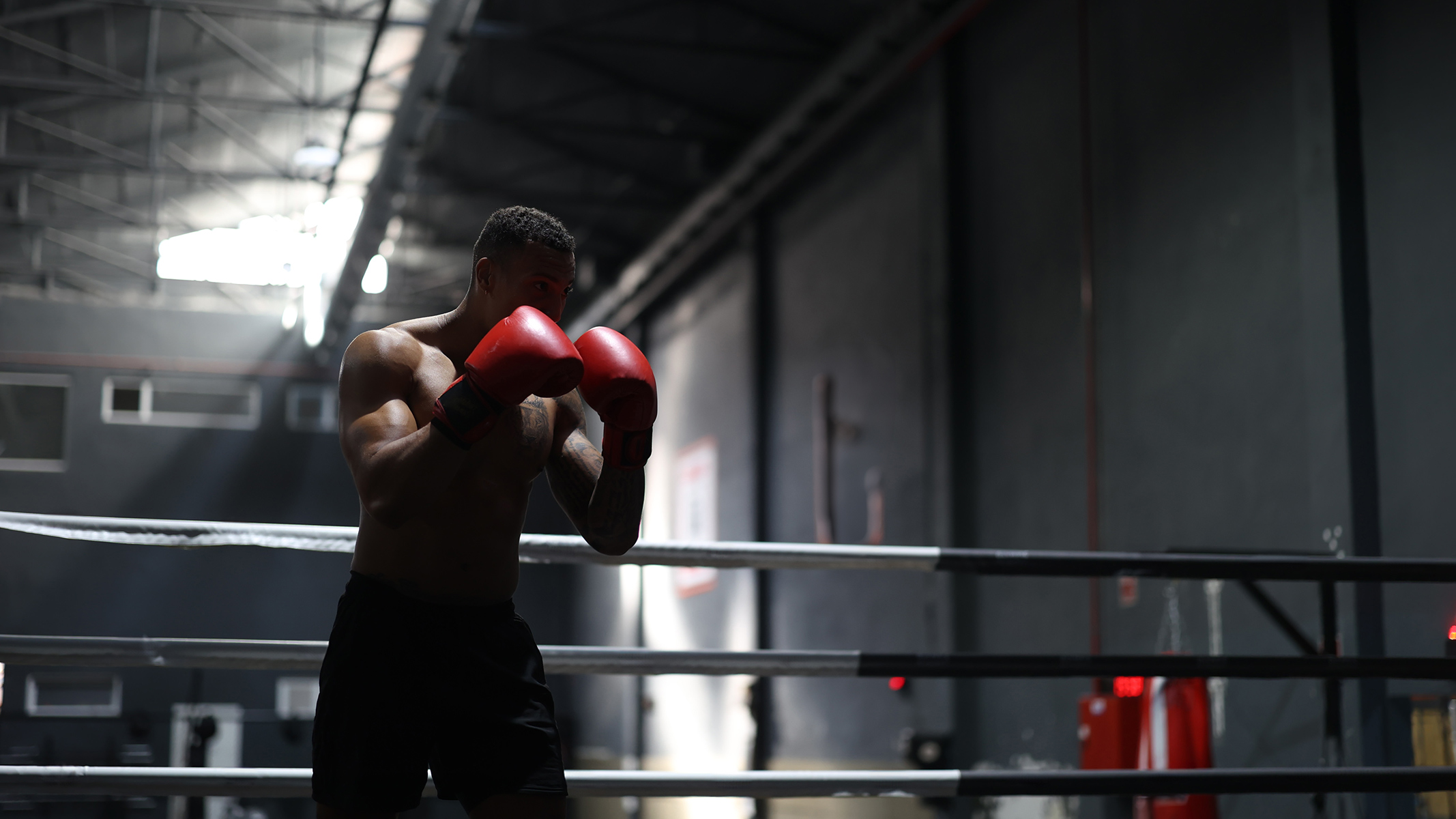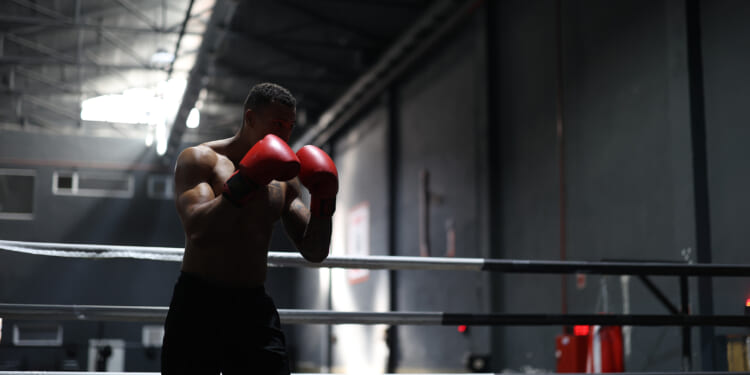
At a recent Manhattan Institute event, former professional boxer and author Ed Latimore joined City Journal contributing editor Rob Henderson for a wide-ranging conversation. Latimore, who grew up in the Pittsburgh projects, overcame addiction, found success in the ring, earned a degree in physics, and built a large following as a writer and speaker. His new book is called Hard Lessons from the Hurt Business: Boxing and the Art of Life. Henderson—author of the acclaimed memoir Troubled and originator of the term “luxury beliefs”—explored parallels in their experiences. What follows is an edited transcript of their exchange, which traces Latimore’s journey from a violent childhood to lessons learned in boxing, the Army, and beyond.
Rob Henderson: Ed, I recently reviewed Hard Lessons from the Hurt Business for City Journal. As I was writing, I thought back to how I first came across your work in 2019, on what was then called Twitter. I enjoyed your posts on self-mastery, discipline, overcoming obstacles, and avoiding catastrophes on the path to success. You’d write these short, punchy things that stuck with me. Later, I found your longer essays on your website and saw your story. That made me appreciate your writing even more.
Finally, a reason to check your email.
Sign up for our free newsletter today.
We both graduated from college relatively late in life. One difference: you studied physics, which is a real science, while I studied psychology, which is a scam. I say that as a joke—I do love psychology—but it’s not physics.
So let’s start with your background. What was it like growing up in the Pittsburgh projects? And when did you realize that this environment was having a negative effect on you?
Ed Latimore: That question’s come up a lot recently, so I’ve been reflecting on it. I’m 40 now, and I haven’t spent significant time in that neighborhood since I was 14. I didn’t move away, exactly, but I stopped spending time there. I moved out for good at 18.
When I think back, it was a constant mid-level stress. Not low-level—mid-level, because violence was everywhere. At school you fought, not because you wanted to, but because if you didn’t, the fights found you anyway.
And the neighborhood—it was basically a war zone. When I met friends later who said they’d never heard gunfire, I was shocked. That was like hearing someone say they’d never seen rain.
At home, my dad wasn’t around. My mom was abusive. A lot of people don’t think of women as abusive, but she beat me, and it wasn’t always about discipline. Looking back, I think it was cathartic for her. She’d feel better after. The severity depended on her mood. Eventually, after puberty, I was big enough that the dynamic changed.
As for realizing the impact—when you’re going through something like that, you don’t realize it. It wasn’t until I tried to live differently that I saw what I hadn’t learned. For example, when my father died, he left me life insurance money—around $58,000 in 2003 dollars. Within 18 months, it was gone. I didn’t know how to manage money or life.
Later, when my son was born, I understood the emotional side of it. I was carrying around low-level anger. Looking at him, I thought: “How could anyone be cruel to a child?” That’s when I realized a lot of unresolved stuff was floating around from my childhood.
Henderson: When I was writing Troubled, I had a similar reaction. I’d work on a chapter about being six, then I’d see a six-year-old in the world and think, “That’s how small I was when all this was happening.” As kids, we think we’re tough, but in reality we’re vulnerable.
In your book, you tell a story about being arrested in middle school after pulling a prank. Can you share that?
Latimore: I joke on social media sometimes about crackheads—they make me laugh. Better to laugh than cry, you know? There’s that line: “life is a comedy for those who think, and a tragedy for those who feel.”
Anyway, in eighth grade, I thought it would be funny to put sugar in a bag and pretend it was cocaine. To me, it was just a dumb joke—“Ha, I’m selling drugs.” But another kid got mad. Maybe he had relatives who were addicts, or maybe he just wanted a fight. Either way, he got it.
It was a vicious fight. He was a big kid. At one point, he threw an overhead projector at me—I swear I dodged it like Neo in The Matrix. If you were there, you’d have seen me duck in slow motion.
The cops cuffed me, put me in the paddy wagon. Five minutes later, they pulled over, uncuffed me, and said: “Kid, if you’d done that on the street, you’d be dead.” That was enough for me. I didn’t need the full Scared Straight program. The ride there was enough.
Henderson: Around this time, you were in a birth-tracking study and took IQ tests every two years. You’ve written that your scores jumped once you switched schools, and you also describe the influence of your friend Eli and his family.
Latimore: Right. I’d thought IQ was fixed, but my scores jumped from about 100–108 to 130–135 once I left the hood for a different high school. Environment matters.
I chose at 14 to attend a school across town. At first, I was lonely. But I made friends, including Eli Horowitz. We bonded over Marvel vs. Capcom at the arcade. His mom picked us up, invited me for dinner. That was my first time seeing a two-parent household.
The Horowitz family embraced me. They let me come over for dinner even when Eli wasn’t there, then drove me home through my neighborhood at night. Imagine: an old Jewish guy, driving me into the projects at night, dropping me off. That’s love. That’s courage.
That gave me, for the first time, the space to just be a kid. It was a huge influence.
Henderson: You’ve written about disruptive students in your middle school classrooms.
Latimore: Yeah—it was a kind of ghetto Pareto distribution. Five to eight kids caused almost all the problems. But behavior’s contagious. One guy mouths off, others see the teacher won’t respond, and suddenly half the class is in chaos.
Henderson: You also write that good parents matter more than money.
Latimore: Research shows childhood income predicts adult income—but rural poverty doesn’t produce the same outcomes as urban poverty. A big reason is that rural poverty often still includes two-parent households providing love and stability. Urban poverty is more often single mothers, instability, and bad neighborhoods. So good parents matter more than money.
Henderson: You’ve said you weren’t ready for college the first time you enrolled.
Latimore: That’s right. I thought, “Great—food, shelter, a place to study.” But I wasn’t ready for that freedom. It’s like bringing in a stray dog. You give it food, shelter, and love, and the dog still snaps at you. I wasn’t ready to be “normal.” I had all these habits from growing up as I did, and college just exposed them.
I played football my first semester. A coach told me, “You seem smart, but you have the lowest GPA on the team.” I landed on academic probation, then dropped out before they could kick me out.
Henderson: Later, you joined the Army.
Latimore: Yes. At that point, I was drinking heavily and working at T-Mobile for $9.28 an hour. I’d drink before work, during lunch, after work. I had a good amateur boxing career, but it wasn’t paying. I wanted more options. I decided to go back to school, and the Army was a way to pay for it.
I enlisted at 28, doing basic training with teenagers. For them, it was life-changing. For me, it wasn’t that tough—run fast, do the drills, eat when they tell you. I’d already lived harder than that.
Boxing, though—boxing changes you. You only get to make a mistake once, maybe twice. The third time, you’re gone. Either the sport spits you out, or it makes you better.
Henderson: What do people misunderstand about boxing?
Latimore: They think there’s money in it. I don’t know a single fighter who doesn’t have a side job.
And people don’t realize how painful it is. Most folks avoid fights; fighters lean in. That’s why my old coach, Hal Adonis, used to ask new guys, “Did your parents beat you?” If they said no, he’d say, “Then you don’t have what it takes.” Harsh, but the point was: you have to be built for pain. You’re not doing it for the money. You’re doing it because, somehow, you find it fun.
Photo: jose carlos cerdeno martinez / Moment via Getty Images
Source link

















